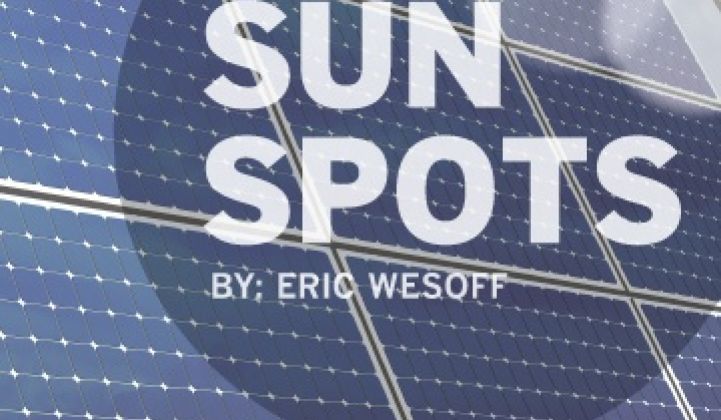LDK (NYSE: LDK), based in China, is one of the world's largest producers of solar wafers, as well as a manufacturer of high-purity polysilicon. But, the solar industry is painfully oversupplied, and most if not all solar firms are losing money.
LDK had an operating loss of $172 million in the second quarter and three straight quarters of losses before that. Because it is a major employer in the poor province of Xinyu, the local government stepped in to pay off $80 milllion in debt a few months ago. As Jeff St. John wrote, "Looks like the Chinese model of solar capitalism has entered a new and, at least for its global competitors, a more troubling phase."
It gets worse.
LDK just sold a 20 percent stake in the troubled firm to Heng Rui Xin (HRX) Energy, a Chinese state-run entity, for approximately $23 million, according to a report in Bloomberg. According to the report, Heng Rui Xin is paying a 21 percent premium to LDK's Friday closing price of 71 cents. The owner of Heng Rui Xin is Hi-Tech Wealth Investment and Developing Co. and state-owned Asset Management Co., with a 40 percent stake. LDK calls HRX "a PRC company invested by privately owned and state-owned funds" on its website.
The news comes amidst a full-blown solar trade war with the United States, which has put tariffs on Chinese imports that are driving some companies out of business. China is threatening retaliation. Meanwhile, it’s not clear that U.S. tariffs will have the intended effect. GTM Research has reported that Chinese module suppliers can avoid it by sourcing cells from Taiwan at an estimated additional cost of only 6 cents to 8 cents per watt, and sources have confirmed that Chinese module prices in the U.S. have continued to trend downward even after the tariff ruling.
Does this validate the SolarWorld and CASM claim of unfair competition and trade? Will tariffs even the playing field for U.S. solar manufacturers? Could this announcement impact the final ITC decsion next month?
Any U.S.- or EU-based firm with financials similar to LDK would long since be bankrupt, in the spirit of Q-Cells or ECD.
If China rescues a strategically important industrial firm and employer -- is that an unfair trade practice? Or is that a sovereign state's right to influence industrial policy, akin to a bank bailout or an automotive bailout?
If a foreign nation subsidizes solar, doesn't that mean the foreign nation is paying for a part of that solar panel? Is China subsidizing solar power in America or looking to monopolize the global PV market and eventually raise prices?
GTM Research's take on the situation? In a recent article on consolidation in the solar industry, Shyam Mehta wrote, "There are ... natural synergies to be gained from the acquisition of certain pure-play Chinese solar firms by larger diversified Chinese firms -- either those that are already involved in module manufacturing or new entrants, such as the state-owned enterprises."
Suntech's founder, Zhengrong Shi, is headed for a showdown with the Chinese government according to Young's China Business, which notes, "Suntech is in similar need of cash, both to fund its operations and also to pay nearly $600 million worth of debt that will come due early next year. But media are reporting that the company's proud founder and Chairman Shi Zhengrong is refusing two government proposals that would give him the funds he so desperately needs."
"One of those proposals would see the government buy the bonds coming due next year and provide an additional capital injection. But a key condition of that package would require Shi to provide his own personal assets to guarantee that those bonds would be repaid -- meaning Shi would probably lose the 30 percent of Suntech shares he owns. Those shares once made him one of China's richest men but are now worth a meager $46 million based on the company's latest market capitalization. The second plan would see Suntech de-list and become a state-owned company."
GTM Research adds, "LDK Solar could serve as a bellwether for future cases. Our sources in China report that a number of state-owned enterprises (e.g., Sinoma, CECEP, CNBM, Guodian, Shenma) have met with LDK regarding possible acquisition deals. The Chinese press also reported that Jiangxi Copper Corporation, a Jiangxi-based SOE (in LDK’s home province), has sold RMB 300 million ($47 million) worth of shares to fund the purchase of LDK shares, which could make LDK one of the first (at least partially) nationalized PV manufacturing giants."
In any case, a $23 million cash injection doesn't make a dent in LDK's debt, finances, or structural issues -- whether the firm is a free-standing entity or owned by the state.
***
Jeff St. John contributed to this article.



